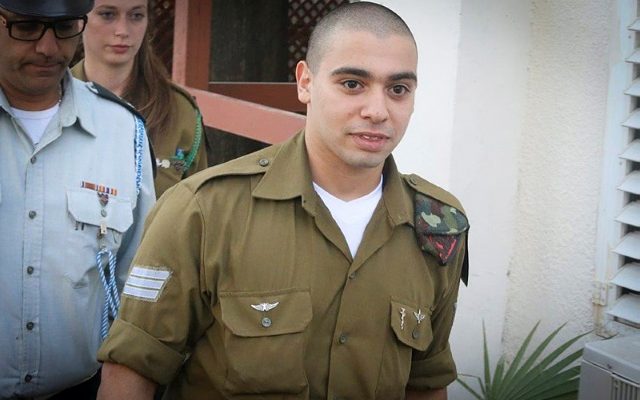There is sharp criticism of Rivlin’s decision not to pardon Elor Azaria from the soldier’s family, political leaders and the public. The soldier was serving time for shooting a neutralized terrorist in Hebron.
By: Aryeh Savir, World Israel News
President Reuven Rivlin on Sunday rejected an appeal to pardon IDF soldier Elor Azaria. Azaria was combat medic stationed in Hebron in March, 2016. The soldier shot a neutralized terrorist in the head as he lay wounded on the ground after committing a stabbing attack against the Azaria’s colleagues.
Azaria claimed during his trial that he felt his life was in danger, saying he thought the terrorist could have been carrying a bomb on his body.
Azaria was sentenced in February to 18 months in prison after being found guilty of manslaughter. He lost an appeal in August, and submitted a request for clemency to IDF Chief of Staff Gadi Eizenkot in August. In September, Eizenkot announced he had accepted a request for clemency from Azaria and had shortened his prison term by four months. Rivlin could have ordered Azaria’s immediate release.
With Eisenkot’s decision, Azaria is now scheduled to be released in September 2018. In February he can request to have his sentence further reduced by 50 percent, as per military regulations.
In his decision to deny Azaria a pardon, Rivlin wrote that the court gave him a relatively light sentence, and that Eisenkot further reduced his sentence for reasons of compassion, and took into account his military service as a soldier in an operational arena. During his service, Azaria was considered to be a highly motivated soldier.
According to Rivlin, any additional shortening of Azaria’s sentence “would harm the resilience to the Israel Defense Forces and the State of Israel.”
“The values of the Israel Defense Forces, and among them the Purity of Arms, are the core foundation of the strength of the Israel Defense Forces, and have always stood strong for us in the just struggle for our right to a safe, national home, and in the building a robust society,” Rivlin concluded.
Rivlin’s decision was received with “disappointment and sorrow” by Azaria’s family and anger by many Israeli politicians. The decision also caused a storm on social media, with some calling Rivlin a traitor and publishing derisory pictures of him. The police has launched an investigation into several of those posts, saying they may constitute incitement.
A poll from January shows 70 percent of the Israeli public is in favor of pardoning Azaria. Prime Minister Benjamin Netanyahu and several senior ministers have likewise expressed support for such a move.





